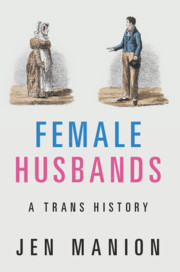Book contents
- Female Husbands
- Female Husbands
- Copyright page
- Dedication
- Contents
- Acknowledgments
- Introduction: Extraordinary Lives
- Part One UK Husbands, 1740–1840
- Part Two US Husbands, 1830–1910
- 5 The Workers
- 6 The Activists
- 7 The Criminalized Poor
- 8 The End of a Category
- Conclusion: Sex Trumps Gender
- Epilogue: The First Female-to-Male Transsexual
- Notes
- Index
7 - The Criminalized Poor
from Part Two - US Husbands, 1830–1910
Published online by Cambridge University Press: 28 February 2020
- Female Husbands
- Female Husbands
- Copyright page
- Dedication
- Contents
- Acknowledgments
- Introduction: Extraordinary Lives
- Part One UK Husbands, 1740–1840
- Part Two US Husbands, 1830–1910
- 5 The Workers
- 6 The Activists
- 7 The Criminalized Poor
- 8 The End of a Category
- Conclusion: Sex Trumps Gender
- Epilogue: The First Female-to-Male Transsexual
- Notes
- Index
Summary
Throughout history, parents have humiliated and disciplined their daughters who were too much like boys or sons who liked girly things. Nineteenth-century women’s magazines and children’s literature often recommended as much. Ministers preached about women’s proper role in the domestic sphere as wives and mothers, criticizing those who were outspoken about politics. Public institutions like almshouses, schools, and prisons established clearly defined spaces and policies for boys and men and a different set of spaces and rules for girls and women. Employers had clear visions for what constituted men’s work and what kind of work was better suited to women. When people assigned female at birth expressed comfort or pleasure in doing things typically reserved for men – from play to work to politics to socializing – any number of people spoke up to challenge or discourage their behavior. In many instances, the disapproval and judgment of loved ones or the rejection and hostility of strangers deterred people from pursuing such a course repeatedly or for a sustained period of time. There was no single principle or law that maintained a gender binary and hierarchy; rather, it was redefined with each challenge and each attempt to suppress that challenge.
- Type
- Chapter
- Information
- Female HusbandsA Trans History, pp. 198 - 230Publisher: Cambridge University PressPrint publication year: 2020

